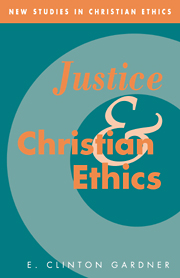Book contents
- Frontmatter
- Contents
- General editor's preface
- Acknowledgments
- 1 Introduction
- 2 The classical tradition of virtue
- 3 The righteousness of God and human justice
- 4 Justice in the Puritan covenantal tradition
- 5 John Locke: justice and the social compact
- 6 The American Republic – a case study: civic virtue and the public good
- 7 Covenant, justice, and law
- Notes
- Select bibliography
- Index
3 - The righteousness of God and human justice
Published online by Cambridge University Press: 31 March 2010
- Frontmatter
- Contents
- General editor's preface
- Acknowledgments
- 1 Introduction
- 2 The classical tradition of virtue
- 3 The righteousness of God and human justice
- 4 Justice in the Puritan covenantal tradition
- 5 John Locke: justice and the social compact
- 6 The American Republic – a case study: civic virtue and the public good
- 7 Covenant, justice, and law
- Notes
- Select bibliography
- Index
Summary
THE THEOGENTRIG CHARACTER OF BIBLICAL FAITH
When one turns to a consideration of justice in the scriptures of Judaism and Christianity, one immediately encounters a radically different perspective from that which appears in Greek moral philosophy. Whereas the moral life is understood primarily as a life of virtue in classical Greek thought, for the Hebrews it is most characteristically portrayed in terms of obedience to God. It must be emphasized at the outset, however, that such obedience is not fundamentally a matter of conformity to a codified system of revealed law; rather, it is a requirement of faithfulness on the part of the people of Israel not only to God but also with one another. While the divine will is typically disclosed in commandments and laws, these are grounded finally in the creating, ordering, and renewing activity of God in history.
In order to comprehend the unfolding biblical idea of justice, we must attempt to understand it, first of all, in its biblical context. Only then will we have a basis for comparing the forms and content of justice in the classical and Hebraic traditions. What do these understandings of justice have in common? How do they differ? Can the biblical concept of justice be reduced to philosophical terms without losing both its distinctive quality and its motivational force? If not, is the possibility of biblical justice limited to a fundamentally sectarian community which shares the biblical story? Otherwise, is the relationship between Aristotelian and biblical justice most adequately expressed in terms of a hierarchical synthesis of reason and revelation?
- Type
- Chapter
- Information
- Justice and Christian Ethics , pp. 29 - 53Publisher: Cambridge University PressPrint publication year: 1995



